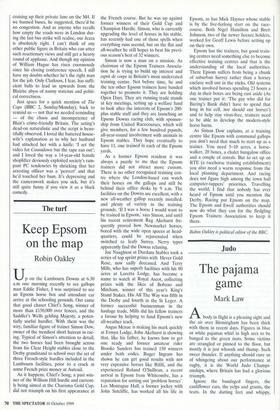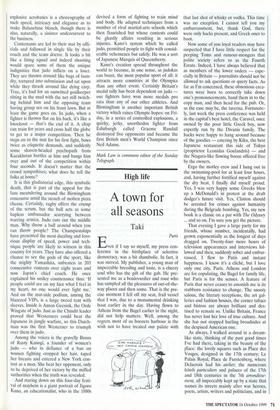Judo
The pajama game
Mark Law
Abody in flight is a pleasing sight and the air over Birmingham has been thick with them in recent days. Figures in blue or white pajamas whirl in high arcs to be banged to the green mats. Some victims are strangled or pinned to the floor, but mostly it is just whoosh and thump. Such sweet thunder. If anything should cure us of whingeing about our performance at rugby, it is the World Judo Champi- onships, where Britain has had a glorious triumph.
Ignore the bandaged fingers, the cauliflower ears, the yelps and grunts, the tears. In the darting feet and whippy, explosive acrobatics is a choreography of such speed, intricacy and elegance as to make Balanchine blanch, though there is also, naturally, a sinister undercurrent to the business.
Contestants are led to their mat by offi- cials and followed in single file by their coach and the team doctor. It looks a bit like a firing squad and indeed shooting would spare some of them the unique indignities that judo inflicts on a loser. They are thrown around like bags of laun- dry, tortured into submission and sat upon while they thrash around like dying carp. True, it's bad for an outwitted goalkeeper sitting in the mud with the net still twitch- ing behind him and the opposing team having group sex on his front lawn. But at least the game goes on. In judo, when a fighter is thrown flat on his back, it's like a knockout — that's the end of it. A chap can train for years and cross half the globe to get to a major competition. Then he steps on to the mat for his first fight, bows twice as etiquette demands, and suddenly some shaven-headed psychopath from Kazakhstan hurtles at him and bangs him over and out of the competition within four seconds. It doesn't matter that the crowd sympathises; what does he tell the folks at home?
It is this gladiatorial edge, this symbolic death, that is part of the appeal for the fans meandering around the Birmingham concourse amid the stench of molten pizza cheese. Certainly, rugby offers the crump of the scrum, but the ball acts as some hapless ambassador scurrying between warring armies. Judo cuts out the middle man. Why throw a ball around when you can throw people? The Championships have presented the most dazzling and fero- cious display of speed, power and tech- nique people are likely to witness in this country for years. They have also offered a chance to see the gods of the sport, like the mighty Yamashita, unbeaten in 203 consecutive contests over eight years and now Japan's chief coach. He once explained his smiley countenance thus: `If people could see on my face what I feel in my heart, no one would ever fight me.' And on the mat-side podium, among the blazered VIPs, is a large tweed tent with sleeves. Inside is Anton Geesink, the Orde Wingate of judo. Just as the Chindit leader proved that Westerners could beat the Japanese in jungle warfare, so this Dutch- man was the first Westerner to triumph over them in judo.
Among the voices is the gravelly Bronx of Rusty Kanogi, a founder of women's judo — who in defiance of a ban on women fighting cropped her hair, taped her breasts and entered a New York con- test as a man. She beat her opponent, only to be deprived of her victory by the miffed authorities when the truth was revealed.
And staring down on this four-day festi- val of mayhem is a giant portrait of Jigoro Kano, an educationalist, who in the 1880s devised a form of fighting to train mind and body. He adapted techniques from a number of rival martial-arts schools which then flourished but whose contests could be ghastly affairs resulting in serious injuries. Kano's system which he called judo, permitted people to fight with consid- erable vehemence but safely. He was a sort of Japanese Marquis of Queensberry.
Kano's creation spread throughout the world to become, in one sense, as judokas can boast, the most popular sport of all: it attracts more countries at the Olympics than any other event. Certainly Britain's medal tally has been dependent on judo — our fighters have won more medals pro rata than any of our other athletes. And Birmingham is another important British victory which raises Olympic hopes: on Fri- day, in a series of controlled explosions, a quirky, jerky, unorthodox fighter from Edinburgh called Graeme Randall destroyed five opponents and became the first British men's World Champion since Neil Adams.
Mark Law is comment editor of the Sunday Telegraph



















































































 Previous page
Previous page